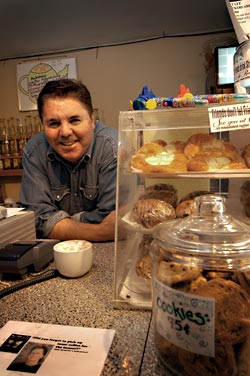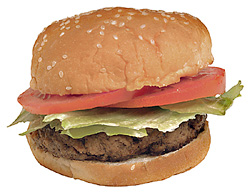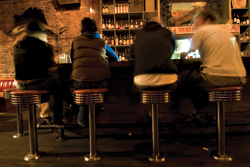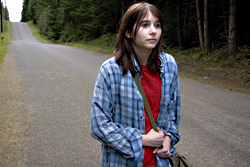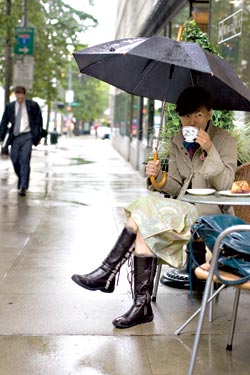Ricardo Guarnero, co-owner of photo- bedecked Café Rozella in White Center, helped found White Center Music Nights in August. On the second Friday of the month, free live music shows have been taking place in a cluster of neighborhood eating/drinking establishments within walking distance of each other. On the final music night of this year, Friday, Oct. 13, bands will play at the Salvadorian Bakery, the Pacific Rim Brewery, Bahn 88, and other venues, including Café Rozella.
We talked to the entrepreneurial Guarnero over the phone about his background, his neighborhood, public art, and coffee culture.
Seattle Weekly: You live in White Center; what’s praiseworthy about the neighborhood?
Ricardo Guarnero: I really like the diversity of the community here. It is the only place in Seattle where you have a melding of all races and ethnicities. From the cafe, I see these wonderfully elegant Somali and Eritrean women walking by, with a regal gait, after purchasing produce at the stand across from the cafe. And I guess I’d have to say I really like so many of the people from this neighborhood—they are so real, organic, and man, do they have stories.
Stories? Do tell.
There are a number of old-timers who have been here since before World War II. Back then, Roxbury divided Seattle, with its “blue laws,” from the unincorporated area where anything went. [On the south side of Roxbury] there was a boardwalk that led to a huge Quonset hut where gambling, drinking, and prostitution flourished.
Where did you grow up? How did you end up in Seattle?
I grew up in El Paso, Texas. My parents are from Mexico—I grew up speaking both Spanish and English. When I was 18, I left for college at Brandeis University. I eventually went to law school at NYU. I wound up coming to Seattle because I had some friends here. I’ve been here since 1988.
What did you do before opening Rozella 16 months ago?
I was a lawyer before this. . . . I left the profession because of differences with the Washington State Bar. [Running a cafe] is very different than practicing law. Law demands that you be hard. This is a much healthier, [more] positive experience—a much nicer way of making a living.
Where did the idea for White Center Music Nights come from?
I’ve always loved music. When my partner Leticia and I opened up the cafe, we did some Brazilian music nights and had music for Mexican Independence Day. We had a really good response from the community. There was a festival-like atmosphere. [Later] I joined the White Center Arts Alliance. I thought if we had a number of venues that provided live music, it would be an opportunity for people to come into the community and get to know it a little better.
Thoughts on White Center’s public art?
I’m not too crazy about the flowers painted on the side of the wall next to the Texaco station on Roxbury. I like the public art at the Dog Wash.
What would you change about the White Center community?
One of the problems the community has is its stigma that it’s an unsafe place. It still has a grittier side to it. We have more than our share of porn shops, a few too many vagrants. But [other gritty] places, like the Lower East Side in Manhattan, have a real lively arts scene.
I would like to see more economic activity. People in the wider community need to come in and see how wonderful it is to shop at a Vietnamese, Mexican, or Cambodian market. The produce is fantastic, the selection is unbelievable, and the prices can’t be beat.
